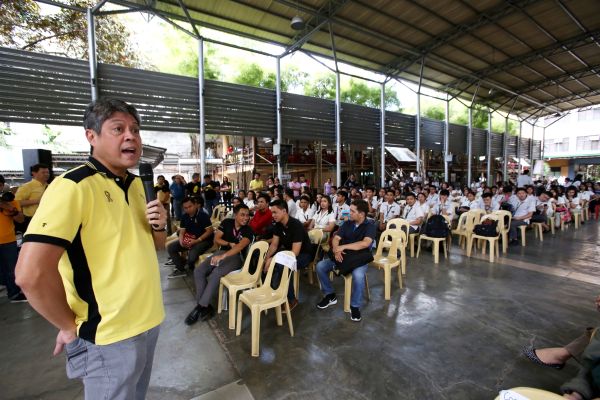
Liberal Party senatorial candidate Francis Pangilinan, who authored the Juvenile Justice and Welfare Act, speak before students of the University of San Carlos. (CDN PHOTO/JUNJIE MENDOZA)
Few are aware that the Juvenile Justice and Welfare Act was amended two years ago to face the challenges of its enforcement, its author and former senator Francis Pangilinan said yesterday.
Pangilinan, principal author of Republic Act 9344 that was passed in 2006, was in Cebu with Liberal Party (LP) vice presidential bet Leni Robredo to attend two fora at the University of San Carlos in Cebu City.
He said certain provisions of the law had to be adjusted to catch up with reality and to strengthen the juvenile justice system in the country.
“We did our part as legislators to plug the loopholes, and now the challenge is with the executive department to implement it properly,” he told reporters.
Under the amended law, Pangilinan said a child aged 12 to 15 years old who commits parricide, murder, infanticide, kidnapping and serious illegal detention where the victim is killed or raped and is implicated in illegal drugs shall be placed in a special youth care facility or “Bahay Pag-asa” called the Intensive Juvenile Intervention and Support Center (IJISC).
Minimum age
The court where the petition for involuntary commitment is filed will decide whether the child has successfully completed the center-based intervention program and is ready to be integrated back into society.
The amended law keeps the age of criminal responsibility at 15 but sets the minimum age of minors confined to the youth care facility at 12.
“Those who do serious offenses will not be allowed to go home. They will be involuntarily confined for a minimum of one year,” Pangilinan said.
A child who commits a crime at age 15 is exempted from criminal liability.
But he or she is subjected to a community-based intervention program supervised by the local social welfare and development officer or admitted to a youth care facility or Bahay Pag-asa managed by local government units.
Law is clear
A child above 15 years old to 17 is also free from criminal liability unless he or she acted with discernment in committing an offense. The law also penalizes any person who instigates minors to commit a crime.
“To use abusing children is an aggravating circumstance. They too have to face the law and be punished. And part of that is if drug couriers use children, the penalty will be double. The law is clear.
Syndicates who use children in carrying out crimes have to be prosecuted to the full extent of the law,” he said.
Pangilinan said the problem now is that amendments to the Juvenile Justice and Welfare Act have not been fully implemented.
“We (legislators) have amended the law, and we believe the law is enough. It has to be executed and implemented properly,” he said.
Stigma
Since LGUs are mandated to allocate one percent of its annual budget for the implementation of the law, Pangilinan said there should be sufficient youth care facilities where child offenders shall be confined for intervention.
Pangilinan has been criticized for crafting a law which some sectors believed will encourage minors to commit crimes.
He lashed back at critics saying children should be saved and protected from the stigma associated with criminal offenses.
“Some policemen are saying children should be penalized so they won’t be used by syndicates. But why won’t our police go after the syndicates? They could easily pin down child offenders and yet they could not arrest these syndicates?” Pangilinan said.